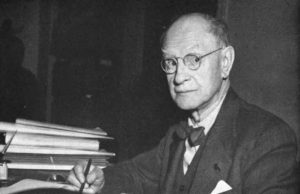Corporate financial distress — the so-called “burning platform” — has long been cited as the crisis necessary to propel a management team to adopt Lean management. Is it? In my book, Triumph of Classical Management Over Lean Management, I said:
“Even Lean’s supposed savior, ‘the burning platform’ – a condition of severe financial distress – has proven to be no match for either the Wealth Creation Playbook or executive culture.”
In other words, business leaders have at their disposal many other well-established methods for responding to corporate financial crisis, and so Lean management is far down the list of their available choices for recovery. Thus, corporate financial distress is usually insufficient to propel a management team to adopt Lean management. What conditions, then, are necessary?
Dr. Harlow S. Person (1875-1955), an economist, was the first Dean of the Amos Tuck School of Administration and Finance at Dartmouth College (1906-1919) and a prominent and tireless advocate of Scientific Management, the precursor to Lean management. In 1947, in the opening section of a paper titled “Progress in Scientific Management,” under the heading “The Paradox of Scientific Management,” Dr. Person said [1]:
“The progress of Scientific Management in the United States presents somewhat of a paradox. There is scarcely an enterprise of stability and consequence, of whatever size, that has not been touched by its influence at one point or another. The cumulative effect played an outstanding part in recent amazing war production. Yet there are few individual examples of comprehensive, integrated Scientific Management. This paradox is one of the most interesting and significant aspects of Scientific Management’s progress, and we shall find it desirable to consider it more fully.”
Dr. Person is noting that some 35 years after the establishment of Scientific Management, few organizations practice it as an integrated (whole) system of management — meaning, both the technical mechanisms and social elements. Nearly all enterprises use the various technical tools and methods that were developed in support of Scientific Management, such as time and motion studies, to improve productivity — sufficient to increase the production of war materiel. Remarkably, the combination of corporate distress, national emergency, and international calamity of war were not enough to propel a management team to adopt Scientific Management in its full form. Which is to say, the “social force” or “social invention” of Scientific Management had yet to be fully realized. Note that the “Training Within Industry” service was created by the U.S. Department of War, not by private industry. So, it is indeed a paradox, which we once again see today with Lean management.
What is required to establish a progressive integrated system of management? Later in his paper, Dr. Person said:
“Although, because of a unique combination of circumstances, Scientific Management originated in the United States, the institution itself does not recognize nationality. It may find manifestation wherever organized activities of any nature are conducted, and wherever there is the motivation and intelligence required for its development. It is not at all improbable that in the future we shall see the highest development of Scientific Management in other countries and in smaller countries than the Unites States. The devastating influence of the recent war on the economies of many countries provides the motivation; in them the necessity for intensive organization for recovery through most effective and economical utilization of human and physical energies is paramount. They [Japan and Germany] are possessed of unexcelled intelligence. This combination of necessity, intelligence, and the availability of a proved and adaptable technique [Scientific Management] establishes the probability. […] Never can the need for Scientific Management be more urgent than in a world torn to chaos by global war. Never can the way be more open for achievement than now, when habits and institutions and ideals and economies have been shattered, and we set ourselves to the great task of assembling the parts, revaluing them, rearranging them, and building a new world that affords life, liberty, assured livelihood, and the pursuit of true happiness, commonly shared, the world over.”
In other words, economic, social, and political devastation caused by losing the war created the conditions for reform of management practice in business. Toyota survived World War II and was forced by circumstances to completely reimagine, over time (and to this day), how resources are deployed and utilized in production and non-production work. They had to abandon their preconceptions. To my knowledge, there was no similar counterpart to Toyota’s progressive integrated system of management that emerged in post-war German industry. Why only Toyota? Perhaps other leaders could not abandon their technical, economic, and social preconceptions. (Interestingly, post-World War I devastation produced a flow production system in the 1920s, similar to TPS, created by Frank George Woollard at Morris Motors in the UK).
To this day, the technical tools and methods of TPS/Lean accepted by executives are largely limited to those that allow management to retain control and power over employees in furtherance of servile manager-worker relationships and other traditions and sentiments that are important to leaders. In other words, the “social force” or “social invention” of TPS/Lean management has yet to be fully realized, except in rare cases. The two most important (overlapping) grounds of emulative behavior, long-established by tradition, are personal wealth and corporate wealth creation (CEO Playbook), which have prevented advancement of the “social force” or “social invention” of TPS/Lean. Business instead still functions as a “classificatory” — the classification of hierarchies, departments, and procedures absent the detailed understanding of processes and interconnections, and inefficiencies therein.
Dr. Person also said:
“Scientific management as a social invention is a universal mode of approach to discovering and establishing the particular management policy and methods most suitable for a particular situation: and although experience has demonstrated that certain validated elements have application in all situations, there can be no forecast of what any particular management is going to be in all its details after the laws of the situation have been discovered.” (italics original) [2]
It is apparent that conditions more severe than a simple corporate burning platform are necessary for change to take place. What conditions could lead to the abandonment of preconceptions and thus accelerate the adoption of TPS/Lean by industry in the future? A burning planet.
Humanity are on track to lose the war of existence due to global warming [3, 4] and associated resource exhaustion. These should provide the necessary combination of economic, social, and political devastation to shatter the business traditions that in the past prevented the ascent of TPS/Lean management. The “social force” or “social invention” of TPS/Lean is the “mental revolution” that will enable both human survival and prosperity.
However, progressive management has always had to compete against technological advancement, which offers what business (and political) leaders perceive to be more attractive solutions to problems. Over the decades, Lean people have learned that the combination of progressive management and certain carefully selected technologies also produces effective solutions, but at lower cost. Unfortunately, this is not widely known among business leaders. Therefore, Lean remains at a disadvantage, as it always has, relative to emerging technologies. One such new technology is “robotic process improvement.” We will see what happens.
[1] Harlow S. Person, “Progress in Scientific Management,” Advanced Management Quarterly Journal, The Society for the Advancement of Management, Volume XII, Number 3, pp. 95-102, September 1947
[2] Harlow S. Person was a tireless supporter and advocate for Scientific Management. Click here to read a memoriam written by Ordway Tead soon after his passing. The memoriam was published in Advanced Management Quarterly Journal, Vol. 21, April 1956, page 26.
[3] William W. Hay, Experimenting on a Small Planet: A History of Scientific Discoveries, a Future of Climate Change, and Global Warming, SpringerNature, Switzerland, Second Edition, 2016
[4] See Cesare Emiliani, founder of Paleoceanography.


